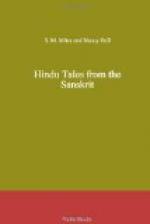“No, no, father,” cried Kadali-Garbha; “I will not have any harm done to my dear one, for I love him with all my heart. All I ask of you is to prove to him that I am innocent of whatever fault he thinks I have committed, and to make him love and trust me again.”
It was hard work to persuade Mana Kanaka to promise not to harm the king, but in the end he yielded. Together the father and daughter rode back to the palace, and together they were brought before Dridha-Varman, who, in spite of the anger he had felt against his wife, was overjoyed to see her. When he looked at her clinging to Mana Kanaka’s arm, as she had done the first time they met, all his old love returned, and he would have taken her in his arms and told her so before the whole court, if she had not drawn back. It was Mana Kanaka who was the first to speak. Drawing himself up to his full height, and pointing to the king, he charged him with having broken his vow to love and protect his wife. “You have listened to lying tongues,” he said, “and I will tell you to whom those tongues belong, that justice may be done to them.”
Once more Kadali-Garbha interfered. “No, father,” she said; “let their names be forgotten: only prove to my lord that I am his loving faithful wife, and I will be content.”
“I need no proof,” cried Dridha-Varman; “but lest others should follow their evil example, I will have vengeance on the slanderers. Name them, and their doom shall be indeed a terrible one.”
Then Mana Kanaka told the king the whole sad story; and when it was ended the wicked woman who had first thought of injuring the queen, and the barber who had helped her, were sent for to hear their doom, which was—–to be shut up for the rest of their lives in prison. This was changed to two years only, because Kadali-Garbha was generous enough to plead for them. As for the third person in the plot, the old witch of the cave, not a word was said about her by anybody. Mana Kanaka knew well enough what her share in the matter had been; but magicians and witches are careful not to make enemies of each other, and so he held his peace.
Dridha-Varman was so grateful to his father-in-law for bringing his wife back to him, that he wanted him to stop at court, and said he would give him a very high position there. But Mana Kanaka refused every reward, declaring that he loved his little home in the forest better than the grand rooms he might have had in the palace. “All I wish for,” he said, “is my dear child’s happiness. I hope you will never again listen to stories against your wife. If you do, you may be very sure that I shall hear of it; and next time I know that you have been unkind to her I will punish you as you deserve.”
The king was obliged to let Mana Kanaka go, but after this he took Kadali-Garbha to see her father in the forest very often. Later, when the queen had some children of her own, their greatest treat was to go to the little home, in the depths of the wood. They too learnt to love animals, and had a great many pets, but none of those pets were kept in cages.




